VET APPROVED

The information is current and up-to-date in accordance with the latest veterinarian research.
Learn more »Click to Skip Ahead
Seeing a mother cat get aggressive with her kittens can be surprising, but it’s not all that uncommon. Cats attacking their kittens can happen for various reasons; most are pretty normal and nothing to be concerned about as long as the kittens aren’t in any real danger, whereas others may involve a trip to the vet for a health checkup.
Let’s explore the possibilities.

The 7 Reasons Why Mother Cats Attack Their Older Kittens
1. The Kittens Are Grown Up
In nature, a mother cat’s role is not only to feed and protect her kittens but also to prepare them to branch out on their own. Kittens can reach sexual maturity as early as 4 months, and it may be at this point that a mother cat feels that her kittens are ready to face the world without her guidance. She may get hostile towards them to encourage them to “fly the nest.” This is how a cat shows her not-so-little-anymore ones that they can no longer rely on her.
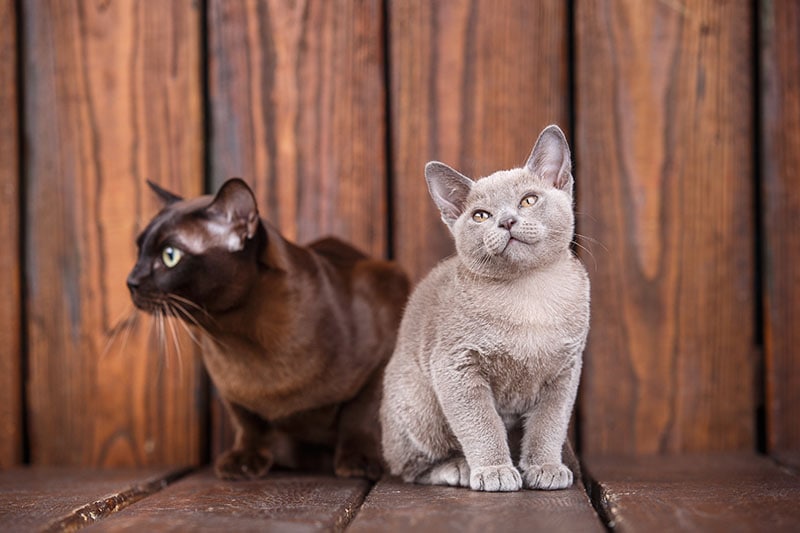
2. She’s in Heat Again
Cats can go back into heat very quickly after having a litter. This can be in as little as 8 weeks after giving birth. If this happens, the queen may feel it is time to wean her litter in order to prepare for another pregnancy.
3. Redirected Aggression
If cats are frightened or aggressively aroused by something they’ve seen but that they’ve not been able to get to, they can lash out on whoever or whatever is closest to them. There can be a delay in the reaction, so a cat that passed by the window half an hour ago could be the cause of your mother cat lashing out at her approaching kitten.
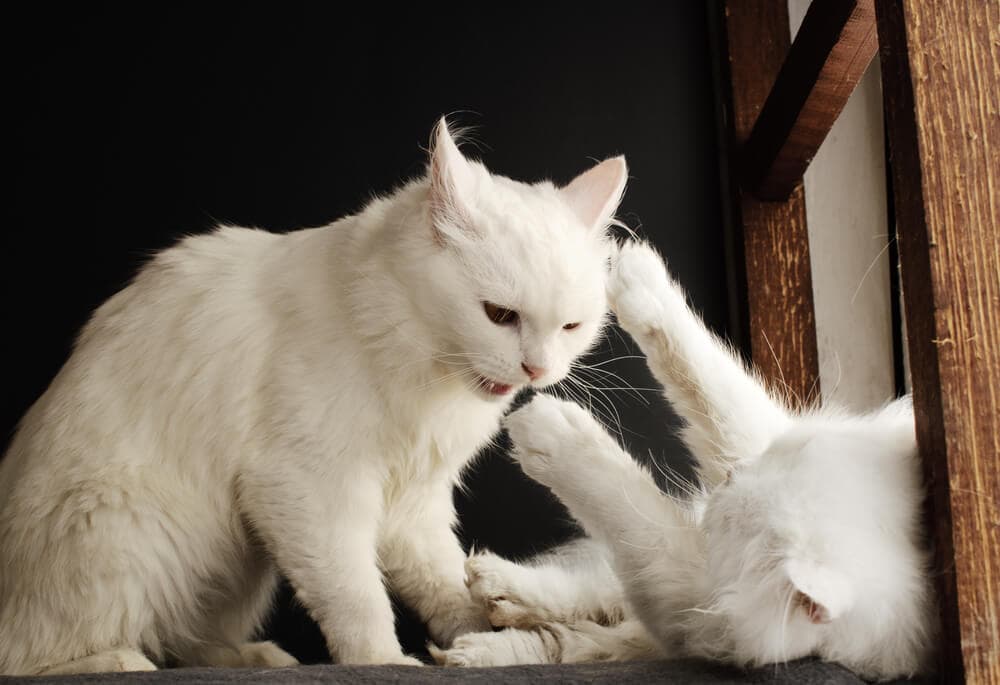
4. Irritation or Illness
Imagine yourself in mama cat’s position for a moment—you’re trying to enjoy a well-deserved snooze, but your five or six young’uns are using you as a climbing frame and getting up to all kinds of mischief to get your attention. Make no mistake, when a mother cat is irritated with her kittens, she could lash out (swiping, bopping, biting, etc.) to get them to back off and give her some peace.
When a mother cat isn’t feeling well because she’s sick or injured, it’s not unusual for her to behave more aggressively than usual with her kittens. When cats are poorly, they don’t want to interact—they want to be left in peace. Kittens won’t understand this and will want to play and snuggle with mom as usual, which could trigger her to lash out because she wants to be left alone. If a mother cat has mastitis (inflammation of the mammary glands) for example, it will be painful for her to feed the kittens, so she may be more aggressive than usual.
Signs of illness or pain in cats include isolating themselves, being lethargic, appetite changes, changes in bathroom habitats, sudden mood changes, poor coat condition, and poor coordination, but these are just a few examples. If you suspect that your cat is unwell in any way, please contact a vet.
5. Correcting Bad Behavior
One of the most important lessons a kitten learns from their mother is how to socialize and interact with other cats appropriately. If one of her kittens is behaving in a way that she doesn’t like, she will typically walk away to show the little one that she will not tolerate their foolishness.
If the kitten continues being naughty, she will proceed to vocal correction (hissing, growling, and/or meowing). If vocal correction doesn’t do the trick, she will use physical correction, which involves swiping at, bopping, or biting the offender. She doesn’t mean to hurt the kitten; she’s just trying to show what is and isn’t acceptable.
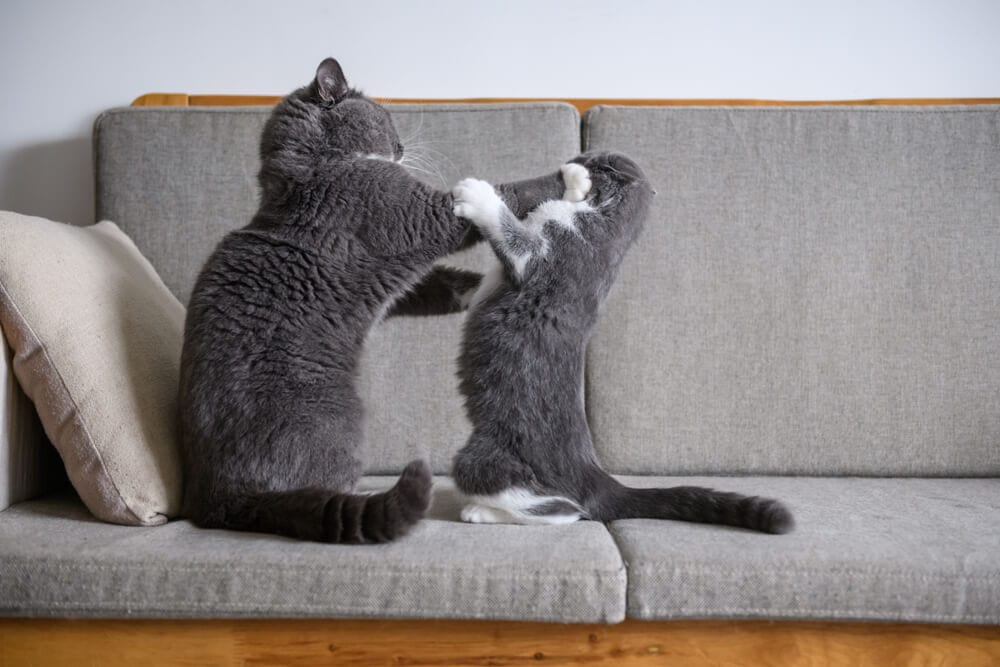
6. Territorial Behavior
Cats are territorial animals and territorial behavior can be seen between a mother cat and her kittens once they reach sexual maturity. Grown-up kittens can become a threat in terms of food and other resources, including space. This is a particular problem in smaller homes with multiple cats. If the kittens are trespassing in mom’s favorite snoozing spot, don’t be surprised if she takes a swing at them as a stark reminder that it’s her territory.
7. Play
It’s common for cats to play-bite and wrestle with their companions, but when it’s a big mama cat versus a kitten, it might look like an attack when it’s just play. Signs that mom is only playing include taking turns to wrestle, chase, and pounce, bouncy rather than rigid body language, a lack of vocalizations, and not getting those claws out.
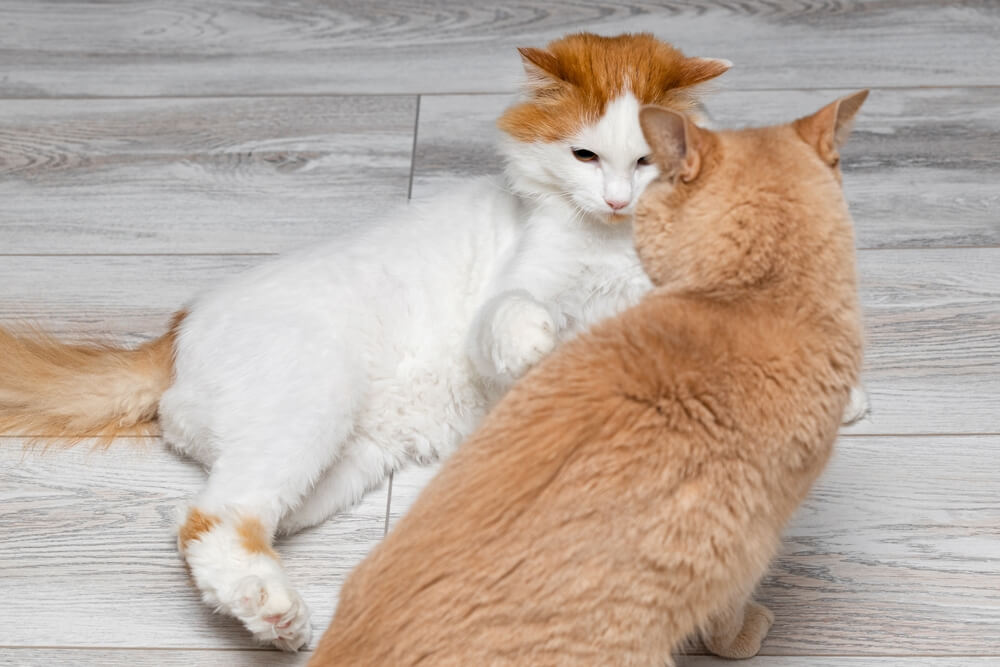

Should I Stop a Mother Cat Attacking Her Older Kittens?
In most cases, no—just let her do her thing. She’s probably just putting the kittens in their place or teaching them how to interact appropriately, and these are important lessons for kittens to learn from their mothers. You should only intervene if it seems like the mother cat is really hurting her kitten or the attack seems especially vicious and prolonged.
Tips for Preventing Mother-Kitten Attacks
Though an occasional bite or swipe is normal, if your cat is attacking her kittens often, it might be time to reassess if her boundaries are being overstepped or her resources threatened a little too frequently. Here are some tips for keeping mama cat happy:
- Make sure she has enough food and water.
- Separate the kittens from mom while she’s eating if they have a habit of stealing her food.
- Make sure mom’s favorite spots are just for her.
- Provide a safe, private spot for mom to retreat to when she needs to.
- Provide plenty of space for the kittens to seek out their own territory.
- Reduce stress in the environment as much as possible.
- If the mother cat is aggressive often, you might want to seek the help of a professional behaviorist.
- Find homes for kittens at 8-10 weeks to give mom back her territory.
- Book mama cat in to be spayed so that she doesn’t get pregnant again.


Conclusion
The majority of the time, mother cats show aggression towards their older kittens to teach them a lesson or due to territorial behavior, and it’s not abnormal in any way.
However, if this behavior is becoming frequent, it could be a signal that the mother cat is unwell, is too stressed, or that the kittens need to be weaned and removed from her territory. If you suspect your mother cat is unwell, please contact a vet for advice. If a cat becomes aggressive with her kittens (especially if they are under 8 weeks) it is a good idea not to breed from that cat again and to get her spayed as this behavior may well recur with future litters.
- https://vcahospitals.com/know-your-pet/recognizing-signs-of-illness-in-cats
- https://vcahospitals.com/know-your-pet/estrus-cycles-in-cats#:~:text=Cats%20have%20their%20first%20estrous,as%20a%20cat%27s%20heat%20cycle
- https://www.petmd.com/cat/behavior/cat-aggression-fighting-biting-and-attacking
- https://www.aspca.org/pet-care/cat-care/common-cat-behavior-issues/aggression-cats
Featured Image Credit: Margarett24, Shutterstock
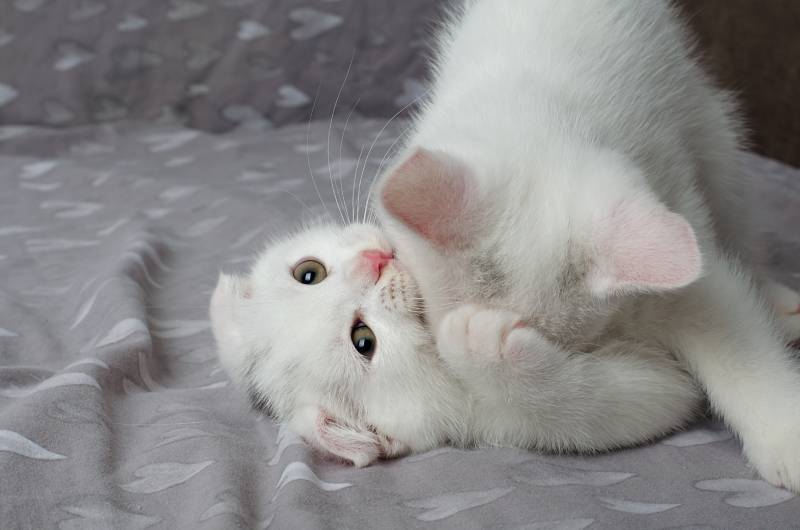






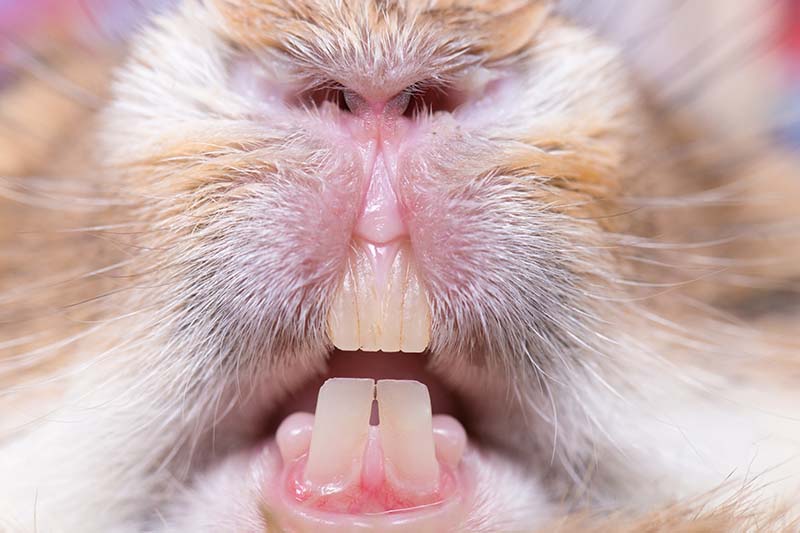
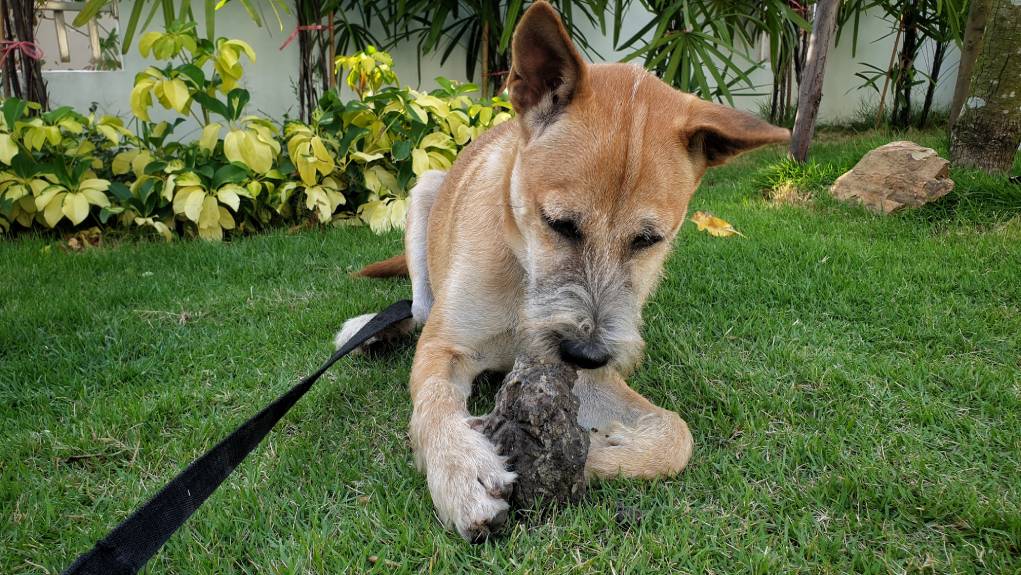
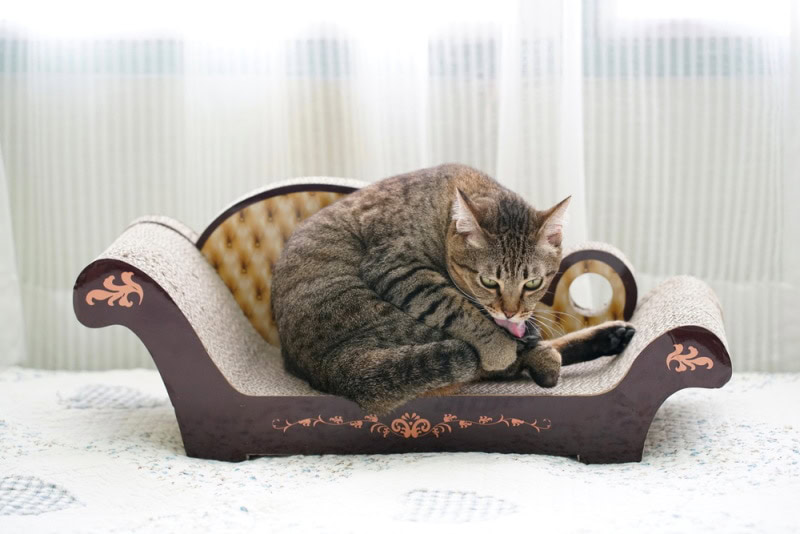



6 Responses
Hi, we adopted a stray pregnant cat who then gave birth to 4 beautiful kitties. She has been an incredible mum, and we rehomed 2 of them after 14 weeks. We decided to keep 2 along with the mum. The cats are currently indoor cats due to circumstances but we are moving in a few months where we will then let them out. We also live in a small flat. Mum cat was spayed about 2 weeks ago where she had complications but is fully recovered. She has since become constantly aggressive towards the kittens and never wants to go near them – lots of hissing and growling although never directed at us. We dont really have anywhere in the flat that she can go where they cant get to her. Not sure what to do, as mum cat is definitely unhappy.
Hello Ellie,
from what we can gather it sounds like the kittens are hurting the mother cat, and she is not fully recovered yet. Please try to do a separate area for her. You can use baby gates or even a closed door to provide her with some space and allow her to fully recover. We are assuming kittens are fully weaned, otherwise you will also need to help to bottle feed them. The following post might be helpful:
– How to Bottle Feed a Kitten in 5 Steps (Vet Answer)
Also please ensure you regularly check the mother cat’s incision site to ensure it is healing properly.
Hope this helps!
Hello, I got my cat (bunny) when she was small (6-8 weeks) she is now 2 1/2 yrs old. She has been my only pet and i have moved with her a few times in that time. She is a inside cat but has gotten out once and got pregnant; About 8 months ago and had 6 babies. I found all of her babies homes but one female (lil baby) who i kept. I got momma cat fixed about 2 months ago Everything has been good, until tonight when Bunny went after lil baby and viciously attacked her for no reason. I had to run after bunny and snatch her up, to keep her from getting to lil baby. I put bunny outside in frantic cause it scared everyone and i dont know why she would do that, its absolutely unlike her behavior. I tried to calm down lil baby and sat with her for 10 mins, bunny started scratching at the door i let her in and she went straight for lil baby again with a vicious attack. Idk what to do about this situation. Do i leave momma cat outside all night. Her baby is so frightened. I hope i dont have to get rid of a cat.
Hello Cierra,
thank you for your question. We are sorry to hear about the issues with your cats. We are sure it must be frightening to see your cats fighting like this, however, as you’ve read, these attacks can be quite normal between mother cat and her outgrown kitten.
As you mentioned, your kitten is 8 months old, which means she is slowly coming into adulthood and her mother may no longer perceive her as a kitten. This can create tension between the two female cats, as cats are territorial creatures.
It is dangerous to intervene during a fight, and we only recommend doing so if you think you can stop the fight successfully without getting hurt.
We recommend following the tips outlined in our article. Start by separating your cats for a period of time. Ensure they have all what they need in their area, not only food, water, and a litter tray, but also environmental enrichment such as toys, hiding spots, perches, and scratching posts. Once they’re calm in their area start doing scent swapping, and once they are comfortable, let the cats smell each other through the door and see each other, until you will think they react calmly to each other’s presence. Then you can start to slowly reintroduce them “in person”. Each meeting should be very short and supervised.
If the attacks would continue, we would like to suggest to book an appointment with one of our vets at http://www.PangoVet.com. They will be happy to consult your situation further and give you some useful tips on how to handle your issues successfully.
Thank you so much for that great advice. 🙏🏽
They are still not getting along after 24 hours. I am going to separate them for a good amount of time and reintroduce them. I’m booking lil baby a spaying appointment, do you think this can be another reason they aren’t getting along, (from the pheromones)?
Hello Cierra,
Booking your younger cat for spaying is definitely a good idea. Not only it could help avoid the hormonal factor that could cause the friction between your two cats, but it also has some health benefits for your cat.
We hope this will help and your cats will start to get along again!